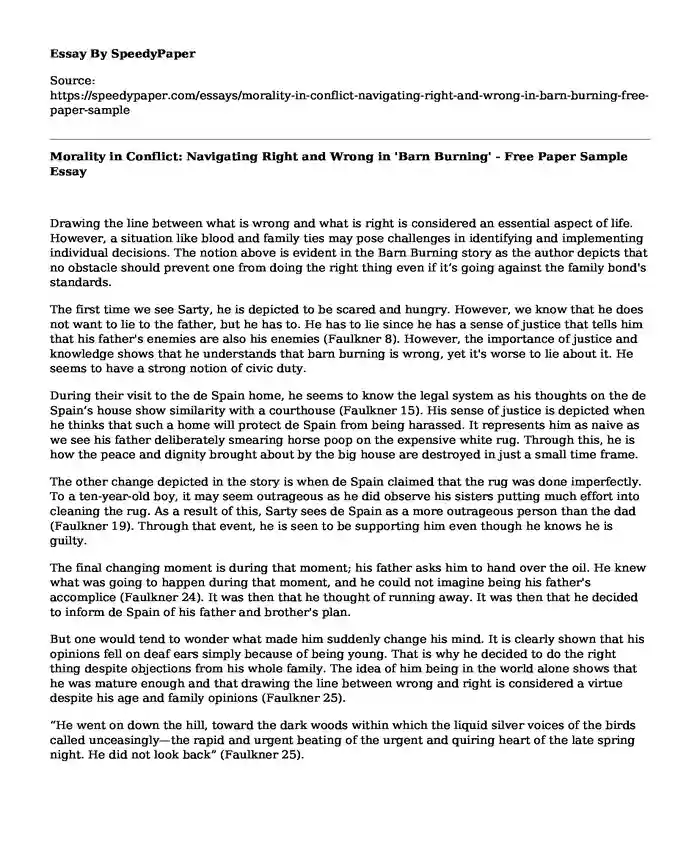
| Type of paper: | Essay |
| Categories: | Literature American literature Books Moral development |
| Pages: | 2 |
| Wordcount: | 529 words |
Drawing the line between what is wrong and what is right is considered an essential aspect of life. However, a situation like blood and family ties may pose challenges in identifying and implementing individual decisions. The notion above is evident in the Barn Burning story as the author depicts that no obstacle should prevent one from doing the right thing even if it’s going against the family bond's standards.
The first time we see Sarty, he is depicted to be scared and hungry. However, we know that he does not want to lie to the father, but he has to. He has to lie since he has a sense of justice that tells him that his father's enemies are also his enemies (Faulkner 8). However, the importance of justice and knowledge shows that he understands that barn burning is wrong, yet it's worse to lie about it. He seems to have a strong notion of civic duty.
During their visit to the de Spain home, he seems to know the legal system as his thoughts on the de Spain’s house show similarity with a courthouse (Faulkner 15). His sense of justice is depicted when he thinks that such a home will protect de Spain from being harassed. It represents him as naive as we see his father deliberately smearing horse poop on the expensive white rug. Through this, he is how the peace and dignity brought about by the big house are destroyed in just a small time frame.
The other change depicted in the story is when de Spain claimed that the rug was done imperfectly. To a ten-year-old boy, it may seem outrageous as he did observe his sisters putting much effort into cleaning the rug. As a result of this, Sarty sees de Spain as a more outrageous person than the dad (Faulkner 19). Through that event, he is seen to be supporting him even though he knows he is guilty.
The final changing moment is during that moment; his father asks him to hand over the oil. He knew what was going to happen during that moment, and he could not imagine being his father's accomplice (Faulkner 24). It was then that he thought of running away. It was then that he decided to inform de Spain of his father and brother's plan.
But one would tend to wonder what made him suddenly change his mind. It is clearly shown that his opinions fell on deaf ears simply because of being young. That is why he decided to do the right thing despite objections from his whole family. The idea of him being in the world alone shows that he was mature enough and that drawing the line between wrong and right is considered a virtue despite his age and family opinions (Faulkner 25).
“He went on down the hill, toward the dark woods within which the liquid silver voices of the birds called unceasingly—the rapid and urgent beating of the urgent and quiring heart of the late spring night. He did not look back” (Faulkner 25).
Work(s) Cited
Faulkner, William. “Barn Burning.” Selected Short Stories of William Faulkner. New York: The Modern Library, 1993. 1-25. 1962.
Cite this page
Morality in Conflict: Navigating Right and Wrong in 'Barn Burning' - Free Paper Sample. (2023, Dec 10). Retrieved from https://speedypaper.com/essays/morality-in-conflict-navigating-right-and-wrong-in-barn-burning-free-paper-sample
Request Removal
If you are the original author of this essay and no longer wish to have it published on the SpeedyPaper website, please click below to request its removal:
- Essay Sample: The Epic of The Odyssey
- Critical Essay Sample on Tom's Decision in the Glass Menagerie
- Free Essay Example on Janis Joplin
- Free Essay Example - Mentalism
- Essay Sample - Good Country People
- Free Essay: Comparison between President Trump and Andrew Jackson Political Ideology
- Essay Example: Attention-Deficit/Hyperactivity Disorder (ADHD)
Popular categories




